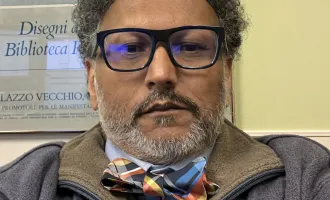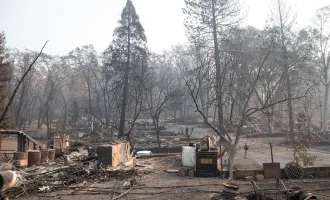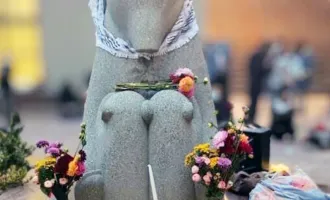This Date in UCSF History: A Modern Day ‘Underground Railroad’ Strategy
Originally published on January 26, 1995. On Jan. 20, Joseph E. Marshall, a founder and executive director of the Omega Boys Club, spoke in Cole Hall as part of the Martin Luther King, Jr. commemoration. Marshall is an educator who has operated an “underground railroad” — his description of the Omega Boys Club approach — that attempts to save one child at a time.
The Omega Boys Club is a youth organization which, while open to all male and female youths, has a particular focus on the needs of young black men and boys.
The club has adopted the old African proverb, “It takes an entire village to raise a child,” as its own.
It brings caring adult role models (particularly black men) into close contact with at-risk inner city kids.
In its eight years of existence, the club’s support has helped over 100 young men and women get to college, as well as helping many others to turn their lives around, making the transition from the jailhouse to the schoolhouse in many cases.
The success of the club has led many communities across the nation to ask for Marshall’s help in setting up similar organizations.
These requests have become so frequent that Marshall is no longer able to fulfill all of them, hence work is in progress on establishing an Omega Institute to serve as an instructional center which would allow visiting activists to see how the Omega Boys Club works and take classes on how to establish similar programs in their communities.
A documentary film and book are also in the works to allow more people to become aware of the club’s philosophy and how to apply it in their neighborhoods.
To extend the reach of the club’s philosophy beyond its doors, Marshall hosts the award winning radio show “Street Soldiers” which airs in Los Angeles and locally. As Marshall describes it, “For its 200,000 listeners, the radio show is their club.”
Marshall began his address by recalling his own experiences as an educator in the inner city: “I’ve always felt that I was the beneficiary of a lot of things that a lot of young people today aren’t. I found that out through my teaching and being with them 180 days a year, 55 minutes a day.”
Marshall described Dr. King’s time as a time of great promise, particularly for African Americans, but also for all Americans.
He described the feeling of disillusionment that many feel in its aftermath: “People often ask, “What happened, what changed? Things looked so bright...’ King tried to change things, and many adults really feel bad that young people in particular are not taking advantage of those opportunities.”
Different Times Marshall maintains that there are three fundamental differences between his youth and what kids have to face today.
The first is lack of employment opportunities.
When Marshall was growing up in South Central LA, he always had some type of job throughout high school and college.
He credits those jobs with instilling in him a work ethic, based on the belief that you can make money legally.
Marshall blamed the absence of such jobs today (70% unemployment prevails for black and brown young people) as denying inner city youth the opportunity to get into that American work ethic.
This is in contrast to the illegal work ethic of fast money right outside their door, which entraps some as young as 8 years old.
The second major difference Marshall cited was the proliferation of weapons on the street: “Today, our young people have access to Uzis and AK-475.”
He feels that this has exacerbated the feelings of hopelessness in marginalized communities since it is hard to get a kid to be serious about his future when all the death he sees on the street tells him that he probably won’t live to see his twenty-fifth birthday.
The other grave danger that was absent in Marshall’s youth is crack cocaine. Marshall observed that this drug is the only agent, chemical or otherwise, that has stopped the African American woman from mothering her child — something that slavery, economic depressions, and Jim Crow laws could not do.
He characterized such an “unnatural” state of affairs (mothers dependent on drugs) as having a devastating effect on the children.
Marshall said that when he was a child, all the adults in the community took responsibility, looking out for him, contacting his parents when necessary and even disciplining him if they caught him doing wrong.
Thirty years ago, the whole community pitched in — even the pimps, drug dealers, and assorted hustlers in his neighborhood told kids to go home or go to school; but now, according to Marshall, they say, “Come on out here and join us.”
Marshall challenged the audience: “The devastating thing about someone like Martin Luther King dying is that very few people are willing to step up when he is gone.
“You can say the same thing about Malcolm X or Medgar Evers, or any of those people who we honor, but the tragic thing is that the rest of us don’t step up when they’re gone, and when you talk about honoring someone, what we really need to do is carry on their work.
“The whole idea of Dr. King’s life is that individuals are important, individuals can make change, individuals must step up.
“My grandmother told me when I was five years old, ‘The more you know, the more you owe,’ and maybe I just know too much, but I think we all owe.”
Following his address, Martin fielded questions, the first of which noted that his discussion of the effects of crack on mothers did not address the responsibilities of fathers.
Marshall acknowledged that we all (mothers, fathers, as well as any adult) have responsibilities to fulfill to ensure the proper upbringing of our children.
In particular, he noted the effect of crack on fathers in that drug dealing dads end up dying or going to jail, which effectively takes them out of the lives of their children.
“A lot of men say they’re selling drugs so they can take care of their children. All they end up doing is being completely removed from the familial situation.”
Marshall also made reference to the movie Boyz N the Hood in his remarks about fatherhood.
In the movie, the protagonist makes it through thanks largely to the fact that his father (Furious) is there to help raise him and show him the way.
The movie also raises a serious issue when it shows that on their return from a father-son fishing trip they see one of the son’s friends (Doughboy) getting arrested for the first time.
Marshall observes that “fathers are in short supply in the inner city” and that Furious should have taken Doughboy under his wing and played an active role in his upbringing.
The Omega Boys Club philosophy makes Marshall an “extended parent,” he said.
“I believe that we are the entire village, so I’m the extended parent.”
Parents of club members, he said, “trust me to do whatever I think is necessary. Just like my parents used to tell the guy on the street, I trust you to do whatever is necessary. What we’re doing is not so much new but 01d... all the children are our children.”
Another audience member asked advice on how to address such messages as “stay in school,” “stay off drugs,” and “work hard” to inner city youth who are living day-to-day in an environment which makes such choices very difficult.
Marshall pointed out that the track record of the Omega Boys Club confirms such messages; he can show them kids from their own communities who have been in a similar situation and have made it through.
Marshall recalled that in his early visits to juvenile hall, the drug dealers there would tell him: “If I don’t do it, somebody else will, I’ve got to get my money,” as well as a litany of other reasons.
Marshall believes that most people listen to this rationale and say, “you know, you’re right” His response, however, was: “But you’re in jail. You’re here, so obviously what you’re doing isn’t working.”
Marshall has dropped the word “hard” from the club lexicon, since anything worth doing is difficult.
“I ask them, ‘how did you come into the world.’ ‘Through my mother.’ I ask, ‘What did she go through?’ ‘Labor.’
“Life is hard at the beginning and it’s going to be hard all the way through. That word will stop them and it will stop us from doing what needs to be done.
“I just tell them. Over and over and over again. ‘You just do it because it needs to be done. There’s no guarantee with any of this.’
“People want life insurance, they want health insurance and they want guarantees. We can’t have guarantees. The only thing that’s guaranteed is the effort you put out.
“I guess it helped me being a teacher, because I realized early on that I wasn’t going to see the results of what I did with 13-year-olds for five years or six years, when a kid would come up to me six years later and say, ‘You made an impact on my life.’
“One of the things about being a parent is that the results that you want you may not see for 15 years. So don’t let that discourage you, because I’ll tell you if you do it, somebody’s going to come back to you at some point and say, ‘I heard you all the time.’”
Marshall believes that all young people want a winning game plan. That they want to get out but don’t know how to get out and it’s his job to show them how to get out.
“It’s like Harriet Tubman on the underground railroad. They wanted to get to the North, but they needed somebody to guide them there.
“What Harriet understood was that here she was, on this trip to the south, and she’d go down and knock on the slave quarters, and she’d say, ‘The train is leaving.’
“I tell this to kids and they say, ‘Not me, I never would have done that.’ There were some slaves who did not want to leave.
“They preferred, for whatever reason, to stay on the plantation in slavery. But what Harriet said was ‘OK, you’re not ready now, I’ll be back. Maybe you’ll be ready on the next trip.’
“And I understand that. I understand that maybe some young people aren’t ready now but they’ll be ready maybe on the next trip. So I think the key thing here is to keep going back...
“Young people aren’t stupid. If you show them a way out, a lot of them are going to take it.
“I find that there are really three steps to dealing with a young person: showing them the things that are putting them at risk, like selling drugs or carrying a gun; showing them how they can develop a winning strategy and get what they’re trying to achieve currently through destructive means; but the key step and the hardest step, is dealing with the anger, fear and pain that they have inside of them.
“Kids are scared. They’re scared that it won’t work, they’re scared to leave their neighborhood and friends. That’s a hard thing to do.
“My job is to provide them with the opportunity and tell them the truth. I don’t have control over whether or not it will happen.”
Marshall hopes that this philosophy has been internalized by the club alumni. He characterizes those who have gone off to college as “a whole bunch of little Kings and Malcolms” who become involved in reaching out to at-risk youth anywhere they are.
“They can’t help themselves, you see, because somebody did it for them. So they’re going to do the work in some form or another throughout their entire life.
“How many lives they’ll touch, I don’t know. They want to do it They’re compelled, they’re driven, and they really can’t understand people who don’t want to do it.
“So they’re apt to be more critical of those that don’t than even I would because they just know how many lives they can save. So they’re the apostles, the disciples.
“So I don’t really worry too much about when I’m gone, because I know that somebody’s going to be there.”
Between the influence of the club and the radio show, Marshall now has a large number of “street soldiers” — his term — out in the neighborhoods who try to turn around those kids who are doing wrong things, and to encourage those who are doing right by telling them “You’re okay,” one kid at a lime.
Although the Omega Boys Club doesn’t interface with the conventional Black church on a formal level, there is a spiritual underpinning to its philosophy.
“I was doing this work because it felt right,” Marshall told his UCSF listeners, “and then I opened this book called The Destruction of Black Civilization, and I read about African culture and African history, and I said, ‘Damn, this is what this is!’
“It was very spiritual reading. It talks about the concept of God and the creator in each of us. America is all about getting over, gelling paid, your individual achievement. What we’re doing is anti-that, so this idea had to come from somewhere else.”
While admitting that there is no magic formula, Marshall did offer some advice on parenting.
“Young people are confused about a few real issues. The first thing is friends.
“Probably the thing that gets them into more problems is friendship. Their definition of friendship is devastating to them... Their definition of friendship means that ‘if you don’t do what I want you to do, you’re not my friend. So if you don’t retaliate, when I want you to retaliate, you ain’t my friend.’
“It’s all about control and coercion. I can’t tell you how many guys I know arc in prison because of friends.
“Some didn’t do the crime and they’re there because of the so-called friend. We tell them simply over and over again: ‘A friend will never lead you to danger.’
“We feel that’s something that is operational —if they can evaluate people and ask themselves, ‘is this person leading me to danger?’ I know that lives have been spared because those kids have used that definition as a way of steering clear of bad influences.
“Kids will often be dissatisfied with things and say, we all gotta change. But what we’ve been able to tell kids about change is that all change begins with the self.
“You have to change yourself first.
“They understand that’s the root of the problem. They may not have control over what other people do, but they do have control over their response to it. ‘If I want things to change, I have to change myself.’
“It’s funny to hear them repeat these things that you said, and to see it working.”



